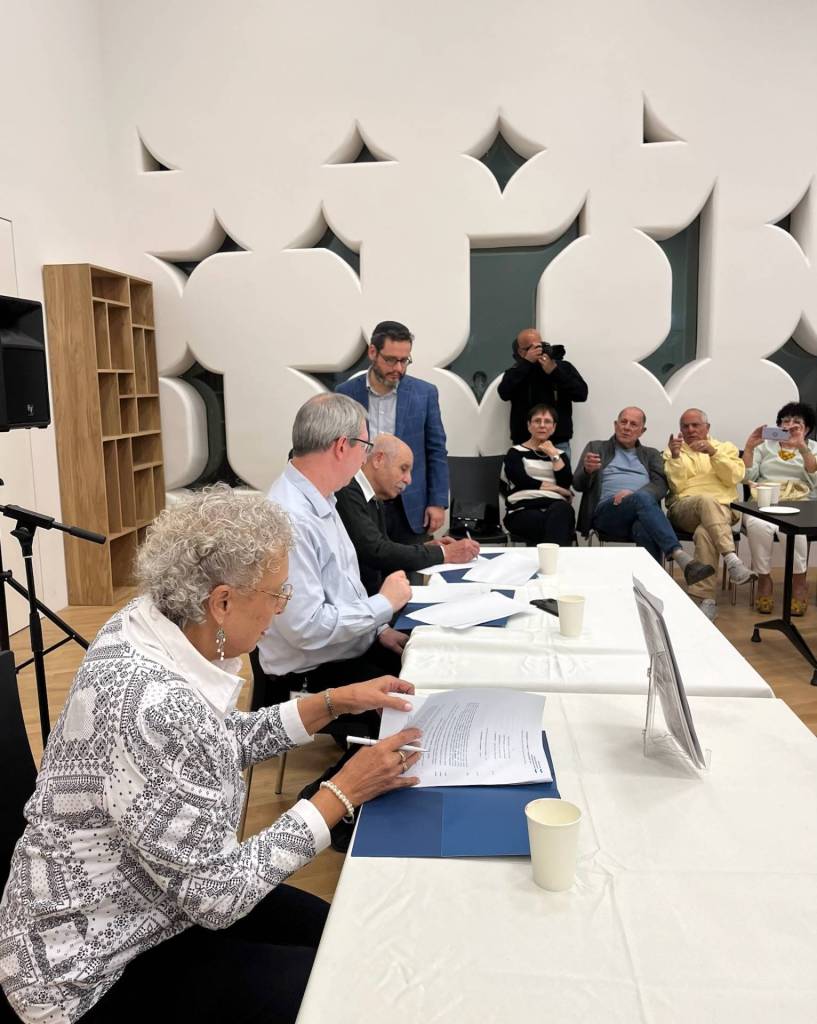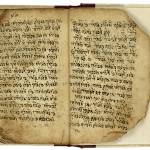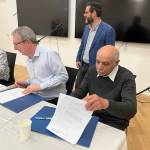The National Library of Israel (NLI) is delighted to announce the donation of the world’s largest collection of 60,000 Yemenite Jewish manuscripts and fragments from the family of the late Yehuda Levi Nahum. The Nahum family formally deposited the collection with the Library on Thursday, January 18, 2024, the 9th of Shevat, 5784. This Hebrew date was particularly auspicious as it is the anniversary of the death of the great 17th century Yemenite poet and rabbi, Shalom Shabazi.
In addition to its size, the collection includes outstanding items such as Judeo-Yemenite copies of works by Maimonides (Rambam), and Rabbi Yihya Saleh (Maharitz), well as antique ketubot (marriage certificates), with more discoveries expected as it is explored.
Yehuda Levi Nahum (1915-1998) was born in Sana’a, Yemen and immigrated at age 14 to Israel in 1929, where he settled, first in Jerusalem, and then in Tel Aviv. “Yuda” Nahum made his living as a butcher, but devoted most of his after-hours time and energy to collecting Yemenite manuscripts. Over six decades, from the early 1940s until his death in 1998, Nahum succeeded in amassing the world’s largest collection of Yemenite-Jewish manuscripts, comprising hundreds of complete works and thousands of fragments, some ancient and some modern.
The collection began with manuscripts sent to Nahum by his parents in Yemen, after he developed an interest in documenting his Yemeni heritage. After his parents immigrated to Israel in 1949, Nahum continued to collect manuscripts by visiting Yemenite Jews in the ma’abarot (immigrant and refugee absorption camps) and towns where they eventually settled. Nahum also engaged in taking apart book-bindings to extract fragments.
The collection was kept at Nahum’s home in Holon where scholars and Israeli presidents, such as Zalman Shazar and Yitzhak Ben-Zvi, would come to view it. Assisted by scholar Professor Yosef Tobi of Haifa University and others, during his lifetime Nahum published some of the documents in several books that changed scholarly perceptions of Yemenite Jewry.
The collection consists of some 45,000 manuscripts and legible fragments; and some 15,000 fragments extracted from book covers or removed from genizot. The most important, complete manuscripts in the collection were cataloged by the Ben-Zvi Institute some 20 years ago. About 70% of the collection was scanned and added to the Friedberg Genizah Project (FGP) digital preservation project, which is a partner, together with NLI, in KTIV: The International Collection of Digitized Hebrew Manuscripts.
“This important collection is a transformative addition to the Library’s documentation of Yemenite-Jewish heritage that will enrich scholarship in this field for years to come,” said Dr. Chaim Neria, Curator of the Haim and Hanna Solomon Judaica Collection at the National Library of Israel. “The Library is dedicated to expanding its collections, and making these materials as widely available as possible. We are enormously grateful to the children of Yehuda Levi Nahum z”l for their generous donation that helps us to further this goal.”
NLI’s collections include many items relating to the history and heritage of Yemenite Jewry and its absorption in Israel. Yemenite-Jewish treasures housed at the Library include an autograph manuscript of Shalom Shabazi’s poetry collection (diwan); a Judeo-Yemenite copy of Maimonides’ Mishneh Torah; a 14th century Maimonides commentary on the Mishnah copied in Yemen in Judeo-Yemenite; passages from the Book of Numbers in Yemenite script, ca. 1050–1150, other antique manuscripts, sacred books, works of poetry, literature, artworks, recordings of interviews, testimonies, prayers, songs as well as rare images of isolated communities.
–ENDS—
Images are available for download here:
https://ftp.nli.org.il/public/folder/dM9hvtuB1EC7bLD8e7xWsg/Nahum%20Yemen%20Collection
Captions:
- The Nahum Collection of Yemenite Manuscripts comprises 60,000 Yemenite-Jewish manuscripts and fragments that will now be available to researchers and scholars at the National Library of Israel. Photo: NLI
- Although 70% of the manuscripts had been scanned, the physical collection remained with the Nahum family that have now donated it to the National Library of Israel. Photo: NLI
- The family of Yehuda Levi Nahum at the signing ceremony at the National Library of Israel. Left to Right: Prof. Yosef Tobi; Talia Hermon (daughter); Dr. Chaim Neria, Curator of the Haim and Hanna Solomon Judaica Collection; National Library CEO Oren Weinberg; Achiassaf Nahum (son). Photo: NLI
- Manuscript in Judeo-Arabic of Shalom Shabazi’s poetry collection (diwan) in the author’s own handwriting. Yemen, 17th century. Image by Ardon Bar-Hama for the book, 101 Treasures from the National Library of Israel.
About the National Library of Israel
The National Library of Israel (NLI) is the dynamic institution of national memory for the Jewish people worldwide and Israelis of all backgrounds and faiths. As Israel’s pre-eminent research library, NLI collections include the world’s largest collection of textual Judaica, as well as world-class collections of Jewish and Islamic manuscripts, ancient maps, rare books, photographs, communal and personal archives, and more. NLI encourages diverse audiences in Israel and around the globe to engage with its treasures via innovative educational, cultural and digital initiatives, as well through a new landmark building that reflects NLI’s core values of democratizing knowledge, and opening its resources to the broadest audience possible. For more information: www.nli.org.il/en






Artículos Relacionados: